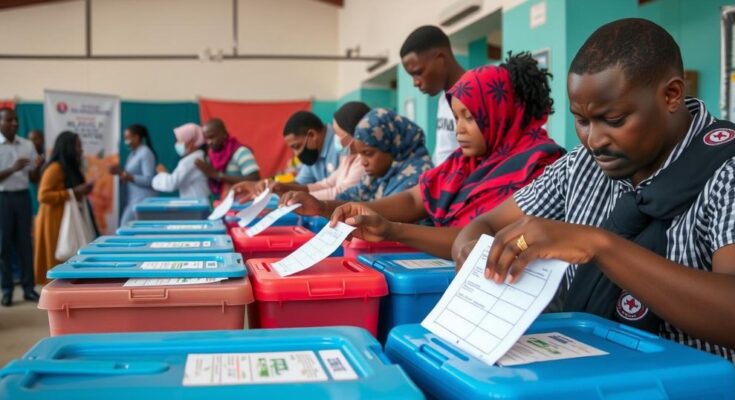Voters in Comoros are electing a 33-seat parliament amid allegations of past electoral fraud against President Azali Assoumani. Approximately 338,000 registered voters are participating, with nearly 100 candidates contesting. Opposition factions accuse Assoumani of authoritarianism and nepotism, while some parties have called for a boycott of the elections. Results are expected by Friday.
Citizens of Comoros are participating in parliamentary elections for the archipelago’s 33-seat legislature, a year following the controversial re-election of President Azali Assoumani. Allegations of widespread electoral fraud marred the previous election, claims which officials from the ruling party have denied. On Sunday morning, polling stations opened for approximately 338,000 registered voters, who have not voted for parliament since January 2020. Nearly 100 candidates, approved by the Supreme Court, are vying for parliamentary seats.
The opposition has raised concerns regarding President Assoumani’s increasing authoritarianism. There are suspicions that he intends for his eldest son, Nour El-Fath, to succeed him after his term concludes in 2029. Since seizing control through a coup in 1999, Assoumani has orchestrated three elections and expanded his son’s role significantly in 2024, granting him overarching responsibilities within government operations. Although some factions, notably Juwa, led by former President Ahmed Abdallah Sambi, who is serving a life sentence, have opted to boycott these elections, others have chosen to participate. Notably, Hamidou Karihila of the opposition Hope of the Comoros party stated, “The Azali regime is weakened … by participating in these elections we are contributing to further exposing the flaws in its system and accelerating its inevitable fall.”
With election results anticipated by Friday, the political landscape in Comoros continues to be marked by tension and division in the midst of allegations and concerns regarding governance and succession.
The Comoros archipelago has experienced political instability for decades, with frequent allegations of electoral misconduct and a background of military coups. President Azali Assoumani rose to power in 1999 via a coup and has since been re-elected multiple times, although his tenure has been sharply criticized by opposition factions. These groups accuse him of consolidating power and fostering a dynastic political structure through the empowerment of his son, intensifying fears of authoritarian rule. The current parliamentary elections reflect broader concerns regarding the integrity of the electoral process and representative governance in the context of ongoing political strife.
In summary, the parliamentary elections in Comoros represent a critical moment for the nation’s political future amidst ongoing allegations of misconduct and concerns over authoritarian governance. The electoral process is fraught with significant opposition to President Assoumani’s regime, which continues to face scrutiny over its practices. As citizens cast their votes, the implications for governance and political direction will be closely monitored.
Original Source: www.begadistrictnews.com.au




